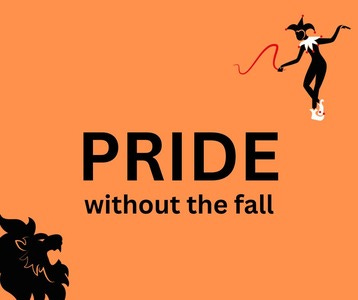Pride has been called the deadliest sin, which I wouldn’t agree with because I think that prize goes to Envy. But pride is a tricky one.
Having pride in your work or your accomplishments can only be good – good for raising standards, good for creativity, and ultimately good for the planet.
Having pride without having worked to accomplish anything is more like arrogance or conceit, which obviously has negative consequences.
Because religious people couldn’t cope with ambiguity, they turned pride into a sin. This is a bit of a nasty trap (one that gets you coming and going) because the opposite of pride is humility which as far as the dictionary is concerned is “having a low opinion of yourself”.
If joy comes from expressing our gifts, we need to have a high opinion of our creative spirit and pride in the work it inspires us to do, while keeping one eye on our ego to make sure it doesn’t grab the reins and upset the apple cart.
The alternative (a dysfunctional or religious perspective) could lead us to become rule following automatons who never express ourselves authentically.
For the religious with their “either/or” perspective, anybody creating good things is doing “God’s work”, while anybody creating bad things is “in league with the Devil”.
Of course, good and bad are subjective and have nothing to do with the force of creativity. It would be crazy to say that electricity is bad. It cooks delicious meals and allows us to read past bedtime. It can also kill people.
So, pride is positive because it brings us praise, which makes us try harder to be better at whatever we are doing.
And pride is negative, because we can get addicted to the praise, which might make us pretend to be better than we are, steal or take credit for someone else’s work.
It’s no wonder religion wanted to err on the side of caution, “Don’t try to be the best version of yourself because you might become arrogant, and then BAD THINGS WILL HAPPEN”.
But too much humility is deadly for Flow – because it is often accompanied by low confidence and lack of trust in the life force.
Likewise, too much obedience is often linked to fear of making mistakes. Flow loves curiosity and spontaneity, not procrastination and anxiety.
If we are going to rewrite the narrative around Pride, we have to get comfortable with ambiguity. This means constantly tuning in to the energy… What’s my motive? Why am I doing this? No really… Why am I doing this?!
It also means being ambivalent about feedback. “People think I’m amazing… Great!” “People think I’m terrible… Great!”
Flow is creative in an exploratory way. Sometimes we like the outcome, sometimes we don’t, but at least we’re participating in the game, rather than sitting on the couch judging everybody else’s efforts.
Individual pride can make us want to be superior to other people. Team pride joins people together and makes them feel connected to something bigger than themselves. This is why Religion flourished in the past and why Football flourishes today.
Of course, the downside to team pride is the aggression that gets released when the team loses, and the arrogance that is displayed when they win. After football matches the ecstasy, drunken revelry, and tribal chanting of “We won!” implies that the fans played a big part in the winning process. But standing on the side-lines singing Sweet Caroline doesn’t really count.
Pride can be used as fuel for forward motion. It allows us to raise our bar. (Yesterday I could only do this now I can do this).
Pride in ourselves, means we don’t need to rely on praise from other people. (This signals the end of people pleasing).
Pride plus gratitude is very powerful. It’s important to express gratitude for our co-pilot because even God appreciates a little feedback.





Very good. A good alternative word to pride as a sin would be hubris.